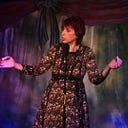Best Gift Ever
An improv warm-up game called “giving gifts” has each player shape something out of thin air, hand it to a partner and tell them what it is. Because it is completely imaginary, the gift can be absolutely anything. The condition of the game is that the recipient has to absolutely love it, say an enthusiastic “yes!” and justify why it is so wonderful. Reasons to love the gift help define the character that is being created in the moment. The characters give rise to a relationship, also being created in real time through the players’ interactions. The gift and its meaning may be imaginary but there is something very real happening between the players: an emotional connection forged through the most inexpensive, infinitely renewable resource people can give to one another: fun.
Round 2 of the “giving gifts” exercise has the recipient identify what the gift is, and the giver justifies why it was chosen. These dynamic interactions, driven by players’ mutual choice to express positive emotions and intentions toward one another, produce psychological safety, another gift of infinite value in relationships. In safety, ideas rise up. More fun, more creativity. And in creativity lies hope.
Creativity is the personal agency to make change, to shape our lives, even if that is as simple as shaping the present moment and going from one small step to another. The stress of uncertainty, in improv and in real life, can cause us to contract and retreat into overthinking, a hall of mirrors that folds us in on our fears and self-doubt. The pressures and problems that surround us can trigger despair, and our baked-in negativity bias can easily justify it with myriad evidence when things seem to be spinning out of control.
The brain does, however, respond to our own efforts to change it, and if we can think in new ways, we might generate new solutions we simply cannot see from our current perspective. And imaginary activities train the brain as effectively as actual ones. “When we practise a skill through imagination, the same neurons are firing as if we were performing the skill in real life,” writes Dr. Helena Popovic in her article “To Harness Brain Plasticity, Start With Enthusiasm” on Sharpbrains.com, because “every mental rehearsal increases the efficiency of electrical transmissions between the involved nerve cells. Mental practice turbocharges our progress.”
While the extreme excitement and positivity that are core elements of improv are generated by conscious choices and imagined scenarios, the shared experience is rich human encounter that sparks real idea generation. Research shows that intensity of the emotion has a direct relationship to its motivational power, which we need when facing major change and struggles with no easy answers. “There’s something about living life with passion and intensity, including the full depth of human experience, that is conducive to creativity,” writes Scott Barry Kaufman in “The Emotions That Make Us More Creative” in Harvard Business Review.
Improv demonstrates the power of imagination, interaction and positive emotional commitment to produce the conditions that give rise not only to new ideas, but to a way of thinking that has fantastic real-life applications. Neuroscience tells us about the connections between brain chemistry, the arts, and creativity. Dopamine — a neurotransmitter present in regions of the brain that regulate movement, emotion, motivation, and feelings of pleasure — is produced in the oldest part of the brain, the brainstem, but released in the newest, the cortex — where we create, think, decide, and plan. “Thus, we feel rewarded when we create new objects or actions,” writes James Zull, professor of biology at Case Western University, “and since creativity is based on the decisions made by the creator, the reward system kicks in when we are in control and inventing things that we have thought of ourselves. Freedom and ownership are part and parcel of the neurochemistry of the arts.”
Making our partners look good — and saying an enthusiastic “yes” to their offerings — in improv and on the stage of life is a gift. Shaping the space between ourselves and the people we care about in a positive way that builds them up is a gift. Having fun together is a gift. And hope — that’s the best gift ever.
Jude Treder-Wolff, is a Licensed Clinical Social Worker, Certified Group Psychotherapist, Certified Practitioner of Applied Improvisation and creative arts therapist. She is host/creator of (mostly) TRUE THINGS, a game wrapped in a storytelling show and president of Lifestage, Inc a consulting/training company that provides creative professional and personal development.
